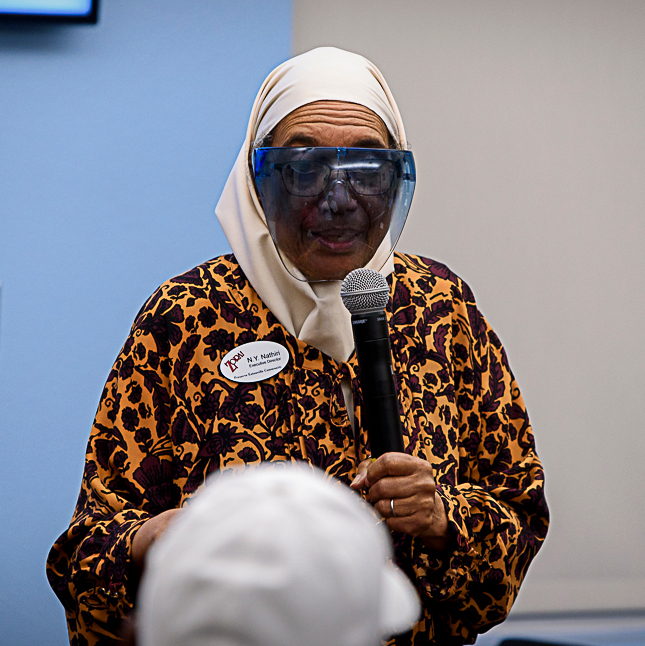SPLC represents group suing to preserve Florida community’s Black heritage
The Southern Poverty Law Center is representing a local preservation association that has filed suit against the school board in Orange County, Florida, over its planned sale of the last 100 acres of property that was the site of a historic school for Black children in one of the country’s oldest Black communities.
The litigation by the Association to Preserve the Eatonville Community (P.E.C.) is the latest action to preserve Black history threatened by commercial development. Last month, residents of Eatonville won a key victory when the town council voted 4-1 against rezoning the historic Robert Hungerford Preparatory High School property, which would have cleared the way for a massive redevelopment on the site.
The school was established with the assistance of Booker T. Washington and the leaders of Eatonville in 1897. It was modeled on the famed Black educator’s Tuskegee Normal and Industrial Institute, which is now Tuskegee University, in Alabama. The high school remained open until 2009.
Though the council rejected proposed zoning changes needed for the mixed-use development, a contract between the school board of Orange County Public Schools (OCPS), which owns the property, and a private developer remains in place. Under that proposal, the development firm could still buy the property but would have to modify its current proposal to conform to the town’s comprehensive plan.
The new lawsuit, filed on March 24 by the P.E.C. asks the court to ensure that the land continues to be used for educational and related purposes that benefit the community.
“Orange County Public Schools should not be serving as a conduit for private real estate developers seeking financial gain,” said N.Y. Nathiri, executive director of the P.E.C. “Instead, Orange County Public Schools should ensure that the legacy of the historic Robert Hungerford Preparatory High School property is preserved and used to benefit the citizens of Eatonville today and in the future. If this sale is allowed to proceed, the rich culture and heritage of the town that Zora Neale Hurston popularized around the world as ‘the first incorporated African American community in the United States’ will be erased.”
The P.E.C.’s objections to the developer’s proposal raised concerns that the commercial and residential development would create a lack of affordable housing, increase traffic and fail to account for increased infrastructure needs. It also lacks attention to historic and cultural preservation that will directly impact P.E.C. and its mission.
“We support good development,” Nathiri said. “Our 21st century vision is one of an ‘Eatonville Renaissance’ that fosters economic prosperity for our community. Instead of selling the historic Robert Hungerford Preparatory High School campus, we welcome its return to a community trust. At that point, Eatonville residents can engage in a strategic community planning process that provides for education and training and that makes the property attractive to a high-value business enterprise, which would add to Eatonville’s tax base for generations-long economic prosperity.”
The history
Founded in 1887, Eatonville is one of the first towns in America to be incorporated by freedmen and was the home of renowned Harlem Renaissance writer Zora Neale Hurston. In 1897, the establishment of the Robert Hungerford Normal and Industrial School provided for the education of Black students, who otherwise were afforded few, if any, educational opportunities due to their race.
In 1951, the Orange County school board acquired the Hungerford property – over 300 acres – through contested court proceedings. In a deed restriction that came with the land, use of the property was restricted to the operation of a public school for the education of Black children.
The new lawsuit asks a state court to declare that the 1951 deed restriction is valid and remains in effect on the remaining portion of the property and that the release of the deed restriction in 2022 – which cleared the way for OCPS to sell the property to private developers – is invalid. The lawsuit also seeks a declaration that the school board failed to comply with its obligations under state law to determine whether the property is unnecessary for educational purposes and that its disposal is in the best interests of the public.
“OCPS is seeking to profit off the sale of land that it holds in trust for the benefit of the community, specifically the children of the town of Eatonville,” said Kirsten Anderson, SPLC deputy legal director for economic justice and P.E.C. counsel. “This lawsuit asks the court to intervene and find that OCPS is not free to simply abandon its obligations to ensure that this land is used for educational or other related purposes.”
Picture at top: Students attended the historic Robert Hungerford Preparatory High School until the Orange County school board acquired the Hungerford property through contested court proceedings.
Read more about the effort to preserve Black history in Eatonville, Florida:
- Preserving Black Heritage: Florida activists fight to save historic site
- ‘Sacred Ground’: Effort to preserve historic Black Florida community wins key victory
- ‘Willing to Fight’: Residents rise up against development that could erase historic Florida town’s rich black heritage
- A timeline of events in Eatonville, Florida
- Descendant of land donor joins effort to preserve historic Florida community
- National Trust for Historic Preservation names Eatonville an endangered site

